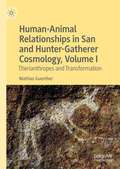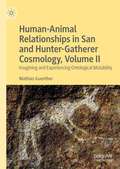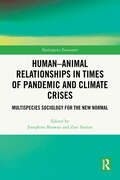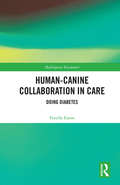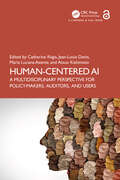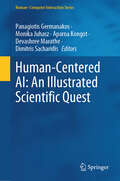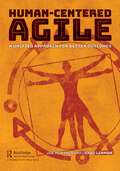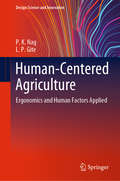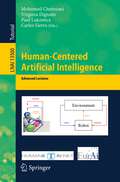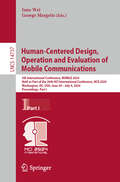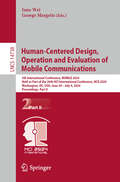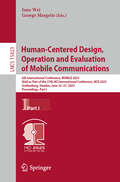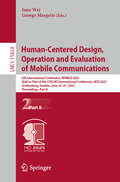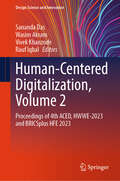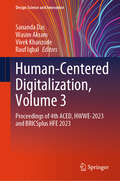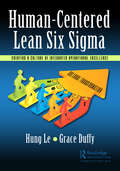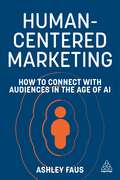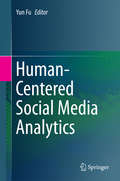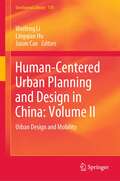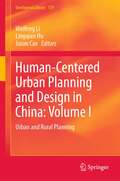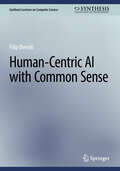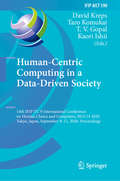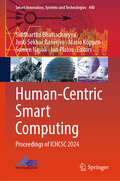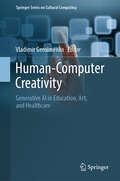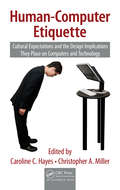- Table View
- List View
Human-Animal Relationships in San and Hunter-Gatherer Cosmology, Volume I: Therianthropes and Transformation
by Mathias GuentherExploring a hitherto unexamined aspect of San cosmology, Mathias Guenther’s two volumes on human-animal relations in San cosmology link “new Animism” with Khoisan Studies, providing valuable insights for Khoisan Studies and San culture, but also for anthropological theory, relational ontology, folklorists, historians, literary critics and art historians. In Volume I, therianthropes and transformations, two manifestations of ontological mutability that are conceptually and phenomenologically linked, are contextualized in broader San myth. Guenther explores the pervasiveness of human-animal hybridity and transformation in San expressive culture (myth, stories and storytelling, ludic dancing and art, ancestral rock art and contemporary easel art), ritual (trance dance curing, female and male rites of passage) and hunting. Transformation is shown to be experienced by humans, particularly via rituals and dancing that evoke animal identity mergers, but also by hunters who may engage with their prey animals in terms of sympathy and inter-subjectivity, particularly through the use of “hunting medicines.”
Human-Animal Relationships in San and Hunter-Gatherer Cosmology, Volume II: Imagining and Experiencing Ontological Mutability
by Mathias GuentherExploring a hitherto unexamined aspect of San cosmology, Mathias Guenther’s two volumes on human-animal relations in San cosmology link “new Animism” with Khoisan Studies, providing valuable insights for Khoisan Studies and San culture, but also for anthropological theory, relational ontology, folklorists, historians, literary critics and art historians. Building from the examinations of San myth and contemporary culture in Volume I, Volume II considers the experiential implications of a cosmology in which ontological mutability—ambiguity and inconstancy—hold sway. As he considers how people experience ontological mutability and deal with profound identity issues mentally and affectively, Guenther explores three primary areas: general receptiveness to ontological ambiguity; the impact of the experience of transformation (both virtual/vicarious and actual/direct); and the intersection of the mythic, spirit world with reality. Through a comparative consideration of animistic cosmology amongst the San, Bantu-speakers and the Inuit of Canada’s eastern Arctic, alongside a discussion of animistic currents in Western humanities and ethology, Guenther clearly paints the relative strengths and weaknesses of New Animism discourse, particularly in relation to San ontology and cosmology, but with overarching relevance.
Human-Animal Relationships in Times of Pandemic and Climate Crisis: Multispecies Sociology for the New Normal (Multispecies Encounters)
by Zoei Sutton Josephine BrowneThis book situates sociological research as a vital tool for understanding, and responding to, the multispecies entanglements that cause, inform and arise from states of crisis involving the environment, climate and zoonotic disease transmission. Considering the consequences of a range of multispecies engagements that challenge the perceived distinction between the social worlds of humans and other animals, it explores the themes of crisis through a range of studies, including ecological disturbance, consumer culture, intensive farming and interspecies relations in urban life. With attention to central questions about life in ‘the now normal’, including the extent to which a human–animal perspective can contribute to our understanding of pandemics, the ideological foundations of mainstream norms for human–animal relations and the scope of current and emerging social movements for reshaping human–animal relations, this volume represents a timely and important call for a sociological vision to embrace the implications of a multispecies planet and to expand the concepts of inclusion and justice. A reconsideration of the human–animal relation that seeks both to revise sociology’s past and inform its future, Human–Animal Relationships in Times of Pandemic and Climate Crises will appeal to scholars across the social sciences with interests in human–animal relations and the environment.
Human-Canine Collaboration in Care: Doing Diabetes (Multispecies Encounters)
by Fenella EasonAdopting an anthrozoological perspective to study the participation of non-human animals in regimes of care, this book examines the use of canine scent detection to alert 'hypo-unaware' individuals to symptoms of human chronic illness. Based on ethnographic research and interviews, it focuses on the manner in which trained assistance dogs are able to use their sense of smell to alert human companions with Type 1 diabetes to imminent hypoglycaemic episodes, thus reducing the risk of collapse into unconsciousness, coma or, at worst, death. Through analyses of participant narrations of the everyday complexities of 'doing' diabetes with the assistance of medical alert dogs, the author sheds light on the way in which each human-canine dyad becomes acknowledged as a team of ‘one’ in society. Based on the concept of dogs as friends and work colleagues, as animate instruments and biomedical resources, the book raises conceptual questions surrounding the acceptable use of animals and their role within society. As such, this volume will appeal to scholars across the social sciences with interests in human-animal interactions and intersections. It may also appeal to healthcare practitioners and individuals interested in innovative multispecies methods of managing chronic illness.
Human-Centered AI: A Multidisciplinary Perspective for Policy-Makers, Auditors, and Users (Chapman & Hall/CRC Artificial Intelligence and Robotics Series)
by Jean-Louis Denis Catherine Régis Maria Luciana Axente Atsuo KishimotoArtificial intelligence (AI) permeates our lives in a growing number of ways. Relying solely on traditional, technology-driven approaches won't suffice to develop and deploy that technology in a way that truly enhances human experience. A new concept is desperately needed to reach that goal. That concept is Human-Centered AI (HCAI).With 29 captivating chapters, this book delves deep into the realm of HCAI. In Section I, it demystifies HCAI, exploring cutting-edge trends and approaches in its study, including the moral landscape of Large Language Models. Section II looks at how HCAI is viewed in different institutions—like the justice system, health system, and higher education—and how it could affect them. It examines how crafting HCAI could lead to better work. Section III offers practical insights and successful strategies to transform HCAI from theory to reality, for example, studying how using regulatory sandboxes could ensure the development of age-appropriate AI for kids. Finally, decision-makers and practitioners provide invaluable perspectives throughout the book, showcasing the real-world significance of its articles beyond academia.Authored by experts from a variety of backgrounds, sectors, disciplines, and countries, this engaging book offers a fascinating exploration of Human-Centered AI. Whether you're new to the subject or not, a decision-maker, a practitioner or simply an AI user, this book will help you gain a better understanding of HCAI's impact on our societies, and of why and how AI should really be developed and deployed in a human-centered future.
Human-Centered AI: An Illustrated Scientific Quest (Human–Computer Interaction Series)
by Panagiotis Germanakos Monika Juhasz Aparna Kongot Devashree Marathe Dimitris SacharidisEmbark on a captivating exploration of human-centered computing and AI, where the convergence of technology and human interaction unveils a world of endless possibilities. In the age of wireless communication, pervasive computing, and the Internet of Things, the synergy between humans and machines has never been more profound. This book delves deep into the heart of this symbiotic relationship, shedding light on the intricate dynamics that define our digital landscape. From the humble human-computer communications, via simple interaction points, to the complex web of virtual networks, every aspect of this journey is meticulously examined. Through a lens of innovation and insight, we navigate within the complex terrain of user actions, individual differences, and algorithmic computations. At the core of our exploration lies a quest for understanding—a quest that transcends the boundaries of traditional research and ventures into the realm of cutting-edge technology. Special emphasis is placed on promoting original insights and paradigms, incorporating aspects derived from psychological theory and individual differences in adaptive computational systems and recommenders. Our goal is simple yet ambitious: by enhancing explainability, fairness, transparency, and decreasing bias during interactions, to empower users with greater control and understanding of the technologies that shape their lives. Through a blend of visual storytelling and specialized textual contributions, we invite you to join us on this extraordinary journey. Whether you're a researcher, practitioner, or enthusiast in the field of AI and human-computer interaction, this book offers valuable insights and perspectives. Prepare to be inspired, enlightened, and empowered through this transformative journey as we unlock the true potential of technology in service of humanity.
Human-Centered Agile: A Unified Approach for Better Outcomes
by Joe Montalbano Brad LehmanThis book is a guide on how to apply Human-Centered Design (HCD) practices to an Agile product development model that is used widely throughout industry and government, where it is applied primarily to software and technology development efforts. This has been an ongoing industry challenge due to the fact that HCD prioritizes time spent understanding the problems to be solved (time spent in the problem space), while Agile prioritizes a fast hypothesize-and-deliver model (time spent in the solution space). Organizations that attempt an Agile transformation abandon it either because it was too difficult or because it did not deliver the hoped-for results. At the same time, efforts to improve the design and experience of their products using Human-Centered Design have a tendency to fall short because it can be difficult to see the ROI of design efforts, even while companies like McKinsey document design-driven successes. What’s more, a company that successfully adopts Agile often seems to have an even harder time implementing HCD and vice versa. This is particularly disappointing since Agile and HCD should be mutually supportive. In practice, Agile teams often bypass HCD efforts in favor of finishing their goals and thinking they are doing well, only to have their work product fail to meet the actual end user’s needs. At first the team will become indignant. “We followed the expert guidance of our Product Owner, the ‘Voice of the Customer,’” they will say, followed by “but… it met all of the Acceptance Criteria, they should love it.” It’s a failure of Agile that this type of sub-optimal delivery happens so regularly and predictably. The fact that team responses can be so accurately predicted in advance (by those who’ve seen this movie many times before) point to a process failure or inefficiency that is widespread and desperately needs to be addressed. Alternatively, teams will invest too heavily in up-front discovery efforts that slow down delivery to an unacceptable point, often while also failing to capture research-based findings in a way that matures the overall strategic product or portfolio understanding. The cost of misfiring goes far beyond a bad delivery or an angry customer. Decreased team morale drives poorer future performance (cost), turnover if left unchecked (more cost), and non-productive blame sessions that lead to degraded faith in the Agile product development model itself. This book identifies solutions based on successful methods of integrating HCD practices by phase into an ongoing agile delivery model, from the discovery through implementation and evaluation, including: key success factors for an HCD/Agile engagement approach, critical points of delivery, and strategies for integrating HCD into teams based on the existing design maturity of an organization or product team.
Human-Centered Agriculture: Ergonomics and Human Factors Applied (Design Science and Innovation)
by P. K. Nag L. P. GiteThis book explores the interplay of farm mechanization, human factors and climatic and other environmental uncertainty in agriculture, using an ergonomics based approach to discuss solutions to the traditionally acknowledged vulnerability of the sector. It converges contemporary research documentation, case studies and international standards on agricultural ergonomics, engineering anthropometry, human factors, basic occupational health services, safety management, human performance and system sustainability to provide a handy reference to students and professionals working to optimize agricultural output while balancing the rational utilization of labour in agricultural practices and human well-being.
Human-Centered Artificial Intelligence: Advanced Lectures (Lecture Notes in Computer Science #13500)
by Virginia Dignum Carles Sierra Mohamed Chetouani Paul LukowiczThe 18th European Advanced Course on AI (ACAI) took place in Berlin on 11-15 October 2021, organized by the European project Humane-AI Net in collaboration with the European AI Association (EURAI). The school included tutorials on different topics, which were selected through an open call to top European AI researchers. In addition, the school also included 4 invited talks, a student poster presentation, and a mentorship program. This volume contains 21 tutorial chapters organized according to the following themes: human-centered AI; human-centered machine learning; explainable AI; ethics, law, and the societal aspects of AI; argumentation; and social simulation. The contributions include learning objectives, reading lists, and links to further resources.
Human-Centered Design, Operation and Evaluation of Mobile Communications: 5th International Conference, MOBILE 2024, Held as Part of the 26th HCI International Conference, HCII 2024, Washington, DC, USA, June 29–July 4, 2024, Proceedings, Part I (Lecture Notes in Computer Science #14737)
by June Wei George MargetisThis book constitutes the refereed proceedings of the 5th International Conference on Design, Operation and Evaluation of Mobile Communications, MOBILE 2024, held as part of the 26th International Conference, HCI International 2024, which was held in Washington, DC, USA, during June 29-July 4, 2024. The total of 1271 papers and 309 posters included in the HCII 2024 proceedings was carefully reviewed and selected from 5108 submissions. The MOBILE 2024 proceedings were organized in the following topical sections: Part I: Mobile health and wellbeing; mobile applications, serious games and advanced interfaces; Part II: Mobile commerce, marketing and retail; mobile security, privacy, and safety; mobile user experience and design.
Human-Centered Design, Operation and Evaluation of Mobile Communications: 5th International Conference, MOBILE 2024, Held as Part of the 26th HCI International Conference, HCII 2024, Washington, DC, USA, June 29–July 4, 2024, Proceedings, Part II (Lecture Notes in Computer Science #14738)
by June Wei George MargetisThis book constitutes the refereed proceedings of the 5th International Conference on Design, Operation and Evaluation of Mobile Communications, MOBILE 2024, held as part of the 26th International Conference, HCI International 2024, which was held in Washington, DC, USA, during June 29-July 4, 2024. The total of 1271 papers and 309 posters included in the HCII 2024 proceedings was carefully reviewed and selected from 5108 submissions. The MOBILE 2024 proceedings were organized in the following topical sections: Part I: Mobile health and wellbeing; mobile applications, serious games and advanced interfaces; Part II: Mobile commerce, marketing and retail; mobile security, privacy, and safety; mobile user experience and design.
Human-Centered Design, Operation and Evaluation of Mobile Communications: 6th International Conference, MOBILE 2025, Held as Part of the 27th HCI International Conference, HCII 2025, Gothenburg, Sweden, June 22–27, 2025, Proceedings, Part I (Lecture Notes in Computer Science #15823)
by June Wei George MargetisThis book constitutes the refereed proceedings of the 6th International Conference on Design, Operation and Evaluation of Mobile Communications, MOBILE 2025, held as part of the 27th International Conference, HCI International 2025, which was held in Gothenburg, Sweden, during June 22–27, 2025. The total of 1430 papers and 355 posters included in the HCII 2025 proceedings was carefully reviewed and selected from 7972 submissions. The MOBILE 2025 proceedings were organized in the following topical sections- Mobile Usability, Experience and Personalization; Mobile Health, Inclusivity and Well-Being; Mobile Security, Protection and Risk Assessment; and, Mobile Applications for Culture, and Social Engagement.
Human-Centered Design, Operation and Evaluation of Mobile Communications: 6th International Conference, MOBILE 2025, Held as Part of the 27th HCI International Conference, HCII 2025, Gothenburg, Sweden, June 22–27, 2025, Proceedings, Part II (Lecture Notes in Computer Science #15824)
by June Wei George MargetisThis book constitutes the refereed proceedings of the 6th International Conference on Design, Operation and Evaluation of Mobile Communications, MOBILE 2025, held as part of the 27th International Conference, HCI International 2025, which was held in Gothenburg, Sweden, during June 22–27, 2025. The total of 1430 papers and 355 posters included in the HCII 2025 proceedings was carefully reviewed and selected from 7972 submissions. The MOBILE 2025 proceedings were organized in the following topical sections- Mobile Usability, Experience and Personalization; Mobile Health, Inclusivity and Well-Being; Mobile Security, Protection and Risk Assessment; and, Mobile Applications for Culture, and Social Engagement.
Human-Centered Digitalization, Volume 2: Proceedings of 4th ACED, HWWE-2023 and BRICSplus HFE 2023 (Design Science and Innovation)
by Rauf Iqbal Vivek Khanzode Wasim Akram Sananda DasThis book presents select proceedings of the Joint International Conference on Humanizing Work and Work Environment (HWWE-2023), ACED2023, and BRICSplus HFE2023 conducted at IIM Mumbai. The conference proceedings examine a range of issues confronted by researchers and practitioners in the field of ergonomics and human factors engineering today. The topics dealt with in this volume include physical ergonomics, workplace design, product design for usability, user interface and experience design, assessment of cognitive workload, digital ergonomics, and other relevant topics in this domain. The book also discusses various methodological approaches used by researchers and scientists in the field of ergonomics, such as participatory ergonomics, survey research, experimental design, data-driven modeling, AI and ML methodologies in Ergonomics and HFE, and other recent approaches. This book will be a useful reference for students, faculty, researchers, practitioners, professionals, and consultants in the field of ergonomics, human factors engineering, and worksystem design.
Human-Centered Digitalization, Volume 3: Proceedings of 4th ACED, HWWE-2023 and BRICSplus HFE 2023 (Design Science and Innovation)
by Rauf Iqbal Vivek Khanzode Wasim Akram Sananda DasThis book presents select proceedings of the Joint International Conference on Humanizing Work and Work Environment (HWWE-2023), ACED2023, and BRICSplus HFE2023 conducted at IIM Mumbai. The conference proceedings examine a range of issues confronted by researchers and practitioners in the field of ergonomics and human factors engineering today. The topics dealt with in this volume include physical ergonomics, workplace design, product design for usability, user interface and experience design, assessment of cognitive workload, digital ergonomics, and other relevant topics in this domain. The book also discusses various methodological approaches used by researchers and scientists in the field of ergonomics, such as participatory ergonomics, survey research, experimental design, data-driven modeling, AI and ML methodologies in Ergonomics and HFE, and other recent approaches. This book will be a useful reference for students, faculty, researchers, practitioners, professionals, and consultants in the field of ergonomics, human factors engineering, and worksystem design.
Human-Centered Lean Six Sigma: Creating a Culture of Integrated Operational Excellence
by Hung Le Grace DuffyThis book focuses on the human side of organizational culture. The authors approach organizational culture from the perspective of alignment to mission, vision, and values. Using a Lean Six Sigma structure, the sequence of chapters begins with the organization and its structure, then drills through strategic, operational, and tactical levels of process and behavior which establish and grow the overall culture of the organization over time. The book begins with foundational principles of organization, through the necessity of aligning processes and systems to mission and vision, assessment, gap analysis for improvement, prioritization, and chapters on qualitative and quantitative approaches for reducing variation and improving systems and behavior. Through this book, readers will: Learn the foundation and core concepts of the organization Discover the "right" focus of shifting the culture of the organization Recognize the building blocks of organizational culture and how to integrate them into a successful, customer-focused system of interconnected processes Focus on people as drivers of technology, rather than the reverse Explore techniques to address the challenges and concerns of today’s training and deployment for organizational performance excellence Use the chapters as short discussions or training workshops for either internal education or public/private technical education.
Human-Centered Marketing: How to Connect with Audiences in the Age of AI
by Ashley FausWith the rise of AI, excess of distribution channels, and focus on tracking every touchpoint in order to drive revenue, consumer trust is at an all-time low. To restore trust, brands need to create delightful, seamless, and impactful journeys to connect with the humans behind the screen.Human-Centered Marketing introduces three frameworks to help mid-senior-level marketers find, connect with, and convert audiences. The book helps you map an audience journey that behaves like a playground instead of a linear funnel, evolve the approach to social media to go beyond conversations and instead facilitate and engage with the community and build thought leaders, to build trust and move your audience into the future.Each chapter includes practical advice to help seasoned marketers shift their strategy and offers tactical implementation recommendations. All chapters include real-world examples from companies like Adobe, Hubspot, and Edelman to demonstrate that this shift from the standard playbook actually works.
Human-Centered Social Media Analytics
by Yun FuThis book provides a timely and unique survey of next-generation social computational methodologies. The text explains the fundamentals of this field, and describes state-of-the-art methods for inferring social status, relationships, preferences, intentions, personalities, needs, and lifestyles from human information in unconstrained visual data. Topics and features: includes perspectives from an international and interdisciplinary selection of pre-eminent authorities; presents balanced coverage of both detailed theoretical analysis and real-world applications; examines social relationships in human-centered media for the development of socially-aware video, location-based, and multimedia applications; reviews techniques for recognizing the social roles played by people in an event, and for classifying human-object interaction activities; discusses the prediction and recognition of human attributes via social media analytics, including social relationships, facial age and beauty, and occupation.
Human-Centered Urban Planning and Design in China: Urban Design and Mobility (GeoJournal Library #130)
by Jason Cao Weifeng Li Lingqian HuThis book provides insights and discusses human-centered urban design and placemaking, human activities and urban mobility in China. It argues that sustainable urban design and mobility should be “people-centered” and concerned about “place-making” in the new era of Chinese urbanization. Successful urban design and placemaking should adopt interdisciplinary approaches to planning and designing “space” and “place”. A core vision is the delivery of urban spaces that can cater to the needs of an increasingly diverse crowd of urban dwellers calling cities home. The book prompts Chinese urbanists to reconsider and explore a sustainable and people-first planning and design approach with Chinese characteristics. The breadth and depth of this book is of particular interest to those faculty members, students, practitioners and the general public who are interested in subjects like urban design, transport planning, mobility analysis and planning, housing and community development, infrastructure planning, environmental planning, social equity and beyond. This book discussing human-centered urban design and placemaking, human activities and urban mobility is part of a 2 volume set. Volume I deals with human-centered urban planning and development, rural planning and urban-rural coordination in China.
Human-Centered Urban Planning and Design in China: Urban and Rural Planning (GeoJournal Library #129)
by Jason Cao Weifeng Li Lingqian HuThis book explores a more human-centered development pathway associated with the ideological shift from "quantity" to "quality" growth in the new era of Chinese urbanization. Sustainable urban and rural planning should be “people-centered” and concerned about urban-rural coordination. The authors argue that successful urban and rural development in China should promote social equity, culture diversity, economic prosperity and sustainable built form. This book prompts Chinese urbanists to reconsider and explore a sustainable and people-first planning approach with Chinese characteristics. The breadth and depth of this book is of particular interest to the faculty members, students, practitioners and the general public who are interested in subjects like urban and regional planning, rural planning, housing and community development, infrastructure planning, climate change and ecological planning, environmental planning, social equity and beyond. This book dealing with human-centered urban planning and development, rural planning and urban-rural coordination in China is part of a 2 volume set. Volume II discusses human-centered urban design and placemaking, human activities and urban mobility.
Human-Centric AI with Common Sense (Synthesis Lectures on Computer Science)
by Filip IlievskiThis book enables readers to understand the challenges and opportunities of developing human-centered AI with commonsense reasoning abilities. Despite apparent accuracy improvements brought by large neural models across task benchmarks, common sense is still lacking. The lack of common sense affects many tasks, including story understanding, decision-making, and question answering. Commonsense knowledge and reasoning have long been considered the “black matter” of AI, raising concerns about the trustworthiness and applicability of AI methods in both autonomous and hybrid applications. This book describes how to design a more robust, collaborative, explainable, and responsible AI through incorporating neuro-symbolic commonsense reasoning. In addition, the book provides examples of how these properties of AI can facilitate a wide range of social-good applications in digital democracy, traffic monitoring, education, and robotics. What makes commonsense reasoning such a unique and impactful challenge? What can we learn from cognitive research when designing and developing AI systems? How can we approach building responsible, robust, collaborative, and explainable AI with common sense? And finally, what is the impact of this work on human-AI teaming? This book provides an accessible introduction and exploration of these topics.
Human-Centric Computing in a Data-Driven Society: 14th IFIP TC 9 International Conference on Human Choice and Computers, HCC14 2020, Tokyo, Japan, September 9–11, 2020, Proceedings (IFIP Advances in Information and Communication Technology #590)
by David Kreps T. V. Gopal Taro Komukai Kaori IshiiThis book constitutes the refereed proceedings of the 14th IFIP TC 9 International Conference on Human Choice and Computers, HCC14 2020, which was supposed take place in Tokyo, Japan, in September 2020, but the conference was cancelled due to the COVID-19 crisis.The 31 revised full papers presented were carefully reviewed and selected from 55 submissions. The papers deal with the constantly evolving intimate relationship between humans and technology. They are organized in the following sections: ethical and legal considerations in a data-driven society; the data-driven society; peace and war; our digital lives; individuals in data-driven society; and gender, diversity and ICT.
Human-Centric Smart Computing: Proceedings of ICHCSC 2024 (Smart Innovation, Systems and Technologies #440)
by Mario Köppen Siddhartha Bhattacharyya Jan Platos Jyoti Sekhar Banerjee Somen NayakThis book includes high-quality research papers presented at the Third International Conference on Human-Centric Smart Computing (ICHCSC 2024), held in Jaipur, India, during July 25–26, 2024. The topics covered in the book are human-centric computing, hyperconnectivity, and data science. The book presents innovative work by leading academics, researchers, and experts from industry.
Human-Computer Creativity: Generative AI in Education, Art, and Healthcare (Springer Series on Cultural Computing)
by Vladimir GeroimenkoThis pioneering volume showcases how generative AI has evolved from a mere tool to a creative partner, transforming the boundaries of innovation and collaboration across various disciplines. With contributions from 53 global experts spanning 21 countries, this comprehensive resource explores the transformative impact of AI on education, art, and healthcare. It reveals how AI enhances learning experiences, fosters new artistic expressions, and revolutionises patient care and medical research. Organised into five thematic parts, the book offers a balanced mix of conceptual frameworks, case studies, and practical insights, providing readers with a thorough understanding of how human ingenuity and artificial intelligence intersect to solve problems, inspire creativity, and redefine industries. Whether you are an academic, practitioner, or inquisitive reader, this volume invites you to engage with the cutting-edge possibilities of generative AI and embrace the future of human-computer collaboration.
Human-Computer Etiquette: Cultural Expectations and the Design Implications They Place on Computers and Technology (Supply Chain Integration Modeling, Optimization and Application)
by Caroline C. Hayes Christopher A. MillerWritten by experts from various fields, this edited collection explores a wide range of issues pertaining to how computers evoke human social expectations. The book illustrates how socially acceptable conventions can strongly impact the effectiveness of human-computer interactions and how to consider such norms in the design of human-computer inter
